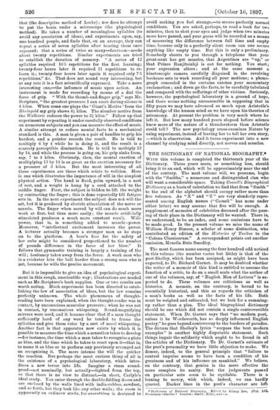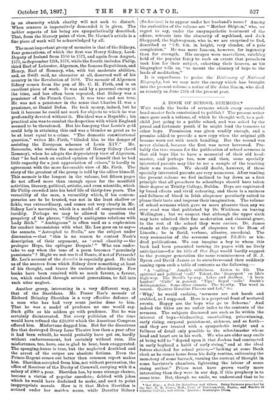THE DICTIONARY OF NATIONAL BIOGRAPHY.* WITH this volume is completed
the thirteenth year of the Dictionary. Three years more, or something less, should bring it to an end, which will be approximately near the end of the century. The next volume will, we presume, begin with the "Smiths," a numerous and distinguished clan who will want a considerable space. Taking Cassell's Biographical Dictionary as a basis of calculation we find that from "Smith" to the end of the alphabet should occupy rather more than five volumes. As "X" and " Z " are very slenderly repre- sented among English names ("Cassell" has none under either letter) we may assume that five will be enough. A supplement of memoirs of celebrities deceased after the pass- ing of their place in the Dictionary will be wanted. There is, we understand, to be an index, and some omissions have to be made good. In the present volume we miss the name of William Henry Simcox, a scholar of some distinction, who contributed an edition of the Histories of Taeitus to the " Catena Classicornm." A correspondent points oat another omission, Menella Bute Smedley.
The most famous name among the four hundred odd noticed in this volume (the number varies but little) is that of the poet Shelley, which has been assigned, as might have been expected, to Dr. Richard Garnet. It may be doubted whether the writer of a memoir of this kind is entitled to assume the function of a critic, to do on a small scale what the author of one of the volumes, say, of "English Men of Letters" is ex- pected to do. These volumes are criticisms as well as histories. A memoir, on the contrary, is bound to be essentially historical, and this as regards the criticism of a man's books as well as the facts of his life. Both must be weighed and estimated, but we look for a summing- up rather than a plea. The ideal biographical dictionary should be one which did not contain a single controvertible statement. When Dr. Garnet says that "no modern poet, unless it be Wordsworth, has so deeply influenced English poetry," he goes beyond controversy to the borders of paradox. The dictum that Shelley's lyrics "surpass the best modern examples" is another highly disputable statement. Such things impair the solidarity which ought to be found in all the articles of the Dictionary. To Dr. Garnet's estimate of the poet's personality we have little objection to make. We demur, indeed, to the general principle that "failure to control impulse seems to have been a condition of his greatness and of his influence on mankind." We believe, on the contrary, that genius is the more effective the more complete its sanity. But the judgments passed on particular acts seem to be equitable. There is a leaning to mercy, with which, indeed, we can hardly quarrel. Darker lines in the poet's character are left • Dictionary of National Biography. Edited by Sidney Lee. (Vol. Ia. Eihearman—Smirke.1 London: Smith. Elder, and co.
in an obscurity which charity will not seek to disturb. When censure is imperatively demanded it is given. The nobler aspects of his being are sympathetically described. That, from the literary point of view, Dr. Garnet's article is a fine piece of work will be acknowledged by all.
The most important group of memoirs is that of the Sidneys, four generations, of which the first was Henry Sidney, Lord- Deputy of Ireland from 1556 to 1571, and again from August, 1575, to September 12th, 1578, while the fourth includes Philip, third Earl of Leicester, Algernon, the famous Republican, and Henry, Earl of Romney, who, with but moderate abilities, and, as Swift said, no character at all, deserved well of his country in the Revolution of 1688. The memoir of Algernon Sidney comes from the pen of Mr. C. H. Firth, and is an excellent piece of work. It was said by a personal enemy at the time, and has often been repeated, that Sidney was a pensioner of the French Court. It was true and not true. He was not a pensioner in the sense that Charles IL was a pensioner, or Daniel Defoe. He took money, indeed, but he took it because he could not work for objects to which he was profoundly devoted without it. His ideal was a Republic ; his practical aim was to combat the despotism with which England seemed to be threatened. But his fancying that Louis's gold could help in attaining this end was a blunder so great as to be at least equal to a crime. "The domestic constitutional question," writes Mr. Firth, "blinded him to the danger of assisting the European schemes of Louis XIV." Mr. Seecombe, who writes the memoir of Henry Sidney (Lord Romney), when he adopts the depreciatory view of Algernon, that "he had such an exalted opinion of himself that he had little capacity for a just appreciation of others," is hardly in agreement with the more favourable view of Mr. Firth. The story of the greatest of the group is told by the editor himself. This memoir is the longest in the volume, but fifteen pages do not afford more than enough space for the manifold activities, literary, political, artistic, and even scientific, which Sir Philip crowded into his brief life of thirty-two years. The versatility of the man, a versatility which, if his contem- poraries are to be trusted, was not in the least shallow or fickle, was extraordinary, and comes out very clearly in Mr. Sidney Lee's narrative, which is a model of compression and lucidity. Perhaps we may be allowed to question the propriety of the phrase, "Sidney's ambiguous relations with Lady Rich." "Ambiguous" is often used as a euphemism for conduct inconsistent with what Mr. Lee goes on to say— the sonnets, " Astrophel to Stella," are the subject under discussion — that "this is no reason to contest Nash's description of their argument, as cruel chastity — the prologue Hope, the epilogue Despair.'" Who can under- take to say when the tone of a poem becomes "genuinely passionate" ? Might we not use it of Dante, if not of Petrarch? Mr. Lee's account of the Arcadia is especially good. He tells us of the sources from which Sidney drew something at least of his thought, and traces its curious after-history. Few books have been received with so much favour, a favour, too, which endured through several generations, to fall into such utter neglect.
Another group, interesting in a very different way, is that of the Sheridans. Mr. Fraser Rae's memoir of Richard Brinsley Sheridan is a very effective defence of a man who has had very scant justice done to him. That he was a model of prudence no one would say. Such gifts as his seldom go with prudence. But he was certainly disinterested. Not every politician of the time would have refused the £20,000 which the American Congress offered him. Misfortune dogged him. But for the disastrous fire that destroyed Drury Lane Theatre less than a year after it had been rebuilt, he would probably have got on, hardly without embarrassment, but certainly without rain. His misfortunes, too, have, one is glad to hear, been exaggerated. The sponging-house is true, but the neglected deathbed and the arrest of the corpse are absolute fictions. Even the Prince-Regent comes out better than common report makes km. Sheridan accepted from him, not without persuasion, the office of Receiver of the Duchy of Cornwall, carrying with it a salary of 2800 a year. Sheridan has, by some strange chance, become a victim of popular anecdote; debited with jokes which he would have disdained to make, and used to point inappropriate morals. How is it that Helen Sheridan is noticed under her maiden name, while Dorothy Sidney (Sacharissa) is to appear under her husband's name ? Among the curiosities of the volume are "Mother Shipton," who, we regret to say, under the unsympathetic treatment of the editor, retreats into the obscurity of mythland, and Jack Sheppard, the highwayman, who is, we are surprised to find, described as "5 ft. 4 in. in height, very slender, of a pale complexion." He was more famous, however, for ingenuity than for strength. His escapes were marvellous, catching hold of the popular fancy to such an extent that preachers took him for their subject, exhorting their hearers, as his biographer tells us, "to mount the chimney of hope to the leads of meditation."
It is superfluous to praise the Dictionary of National Biography, but we may note the energy which has brought into the present volume a notice of Sir John Sim3n, who died as recently as June 24th of the present year.







































 Previous page
Previous page